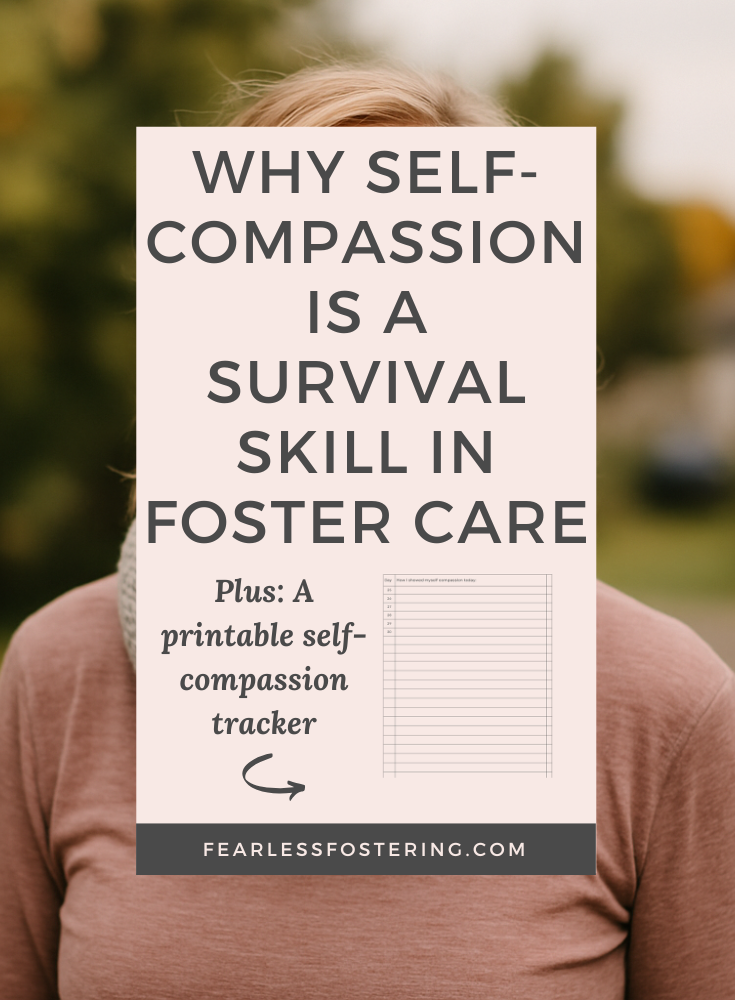
When we think about what it takes to be a good foster parent, we often focus on patience, resilience, advocacy, or strength. But there’s one ingredient that’s often left out—and in my experience, it’s the one that holds everything else together:
Self-compassion.
Not in a soft, fluffy, bubble-bath kind of way. In a gritty, day-saving, survival-skill kind of way.
Because foster care will ask you to show up over and over again when you feel unsure, exhausted, and emotionally stretched thin. And in those moments, what you say to yourself matters more than you realize.
Let’s talk about why self-compassion is absolutely essential in foster care—and how to begin practicing it when it feels unnatural or even selfish.
What Is Self-Compassion, Really?
At its core, self-compassion is simply treating yourself with the same kindness, care, and understanding that you would offer to someone you deeply love.
Dr. Kristin Neff, the leading researcher on self-compassion, breaks it down into three components:
-
Mindfulness – Noticing your suffering without exaggerating or denying it
-
Common Humanity – Recognizing that suffering is part of being human
-
Self-Kindness – Responding to yourself with warmth and care instead of judgment
In the context of foster care, self-compassion might look like:
-
Saying, “This is hard and I’m doing the best I can,” after a rough visit
-
Acknowledging your grief instead of powering through it
-
Forgiving yourself for losing your temper or forgetting to sign the permission slip
Why It Matters in Foster Parenting
Foster care is full of emotional landmines: uncertainty, secondary trauma, family court, difficult goodbyes, reunification complexities, and attachment struggles.
And yet, foster parents are often expected to be endlessly giving, regulated, and available—for everyone else.
The pressure to “get it right” all the time is real. And when we inevitably don’t? The shame creeps in.
Self-compassion acts as a buffer against burnout and shame. It allows you to acknowledge the hard without spiraling into self-blame. It keeps you rooted in the belief that you are doing something incredibly meaningful—even when it’s messy.
The Consequences of Not Practicing Self-Compassion
If we don’t have a practice of self-compassion, we often default to:
-
Perfectionism (“I have to handle this perfectly or I’m failing them.”)
-
Guilt loops (“I should have said that differently. I should be doing more.”)
-
Emotional shutdown (“It’s too much. I can’t let myself feel this.”)
-
Martyrdom (“I just have to keep going no matter what.”)
These patterns are understandable—but they aren’t sustainable.
Foster care is a marathon, not a sprint. And shame is not a sustainable fuel source.
What Self-Compassion Looks Like in Real Life
Let’s break it down into simple, doable actions:
1. Checking In With Yourself
Ask:
-
“What am I feeling right now?”
-
“What do I need?”
-
“What would I say to a friend going through this?”
Even 30 seconds of self-awareness can help you shift from reactivity to regulation.
2. Letting Go of the “Perfect Foster Mom” Myth
You do not have to be:
-
Always calm
-
Always organized
-
Always “on”
You are allowed to be real. Real creates connection. Real creates safety.
3. Speaking Kindly to Yourself
Try phrases like:
-
“Of course this is hard.”
-
“I’m allowed to have feelings too.”
-
“It’s okay to not have all the answers.”
-
“I’m learning. And that’s enough right now.”
These may feel awkward at first. But with repetition, they become your new inner voice.
Why This Isn’t Selfish
Self-compassion isn’t indulgent. It’s protective.
It protects your:
-
Nervous system
-
Relationships
-
Emotional capacity to keep showing up
When you are kind to yourself, you model emotional safety for your children. You create space to repair when ruptures happen. You become a soft place to land—for both them and yourself.
Tools to Help You Practice
If you’re new to this idea, or it feels out of reach, you’re not alone. That’s why I created practical tools to make self-compassion feel possible.
Try the Self-Compassion Tracker
A simple printable to help you notice your thoughts, regulate your emotions, and reframe your inner dialogue. You can use it in the morning, after a visit, or anytime you’re spiraling.
Explore the Foster Mama Survival Guide
Quick, actionable resources that are built for the real-life chaos of foster care. It includes reminders, reframes, and calming tools to help you come back to center.
What Happens When You Practice Self-Compassion
You’ll likely notice:
-
More patience—for yourself and your kids
-
More clarity in tough moments
-
Less emotional exhaustion
-
A stronger connection to your own intuition
You’ll find that showing up for yourself makes it easier to show up for everyone else—not out of obligation, but from a grounded place.
Final Thoughts
Foster care is beautiful. It’s also brutal. And self-compassion is what makes it survivable.
It’s what keeps your heart soft, your mind clear, and your nervous system intact. It’s not something you earn after you’ve done everything right. It’s something you deserve in every messy, in-between moment.
You are doing incredibly sacred work.
And I hope you’ll speak to yourself like someone who is.
With you in it,
Cathleen
+ show Comments
- Hide Comments
add a comment